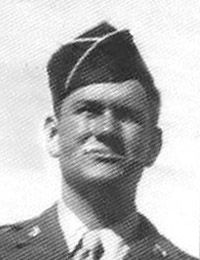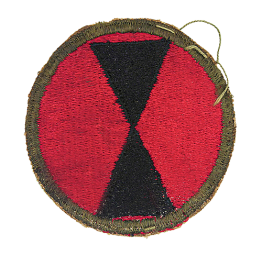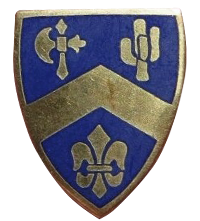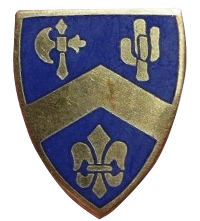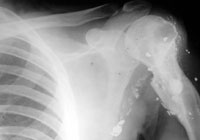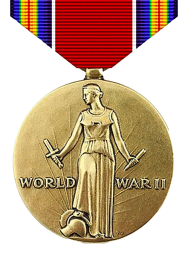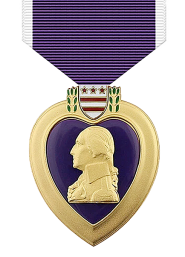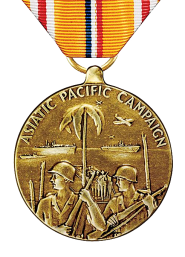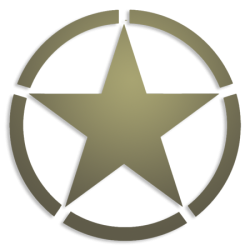My experience with the military way of life began in 1938 in Scottsboro, AL. when my dad joined the American Legion there. I was 12 years old. They formed a chapter of The Sons of The American Legion, (SAL). There were about 12 of us at first averaging from 11 to about 14 years old and the old WW1 Vets decided we would be their close order drill squad. They taught us close order drill and would take turns drilling us. They would drill us till we were worn out but it was fun too. I remember one old guy shouting "Eyes RIGHT!" "When I say, Eyes Right ! I want to hear them eyeballs click." We all had a good time and it became great fun for us. They decided we would become a Fife and Drum Corps which we did. We had 10 fifes and 2 snare drums. I bet we looked like that picture, "The Spirit of '76" when we marched and played.
I joined the 2nd Bn 184th Infantry, 7th Infantry Division as a replacement after having been chosen to serve in Headquarters Company as an Intelligence Observer in S-2 MOS 761. Now, this position was what we were sent to be trained for but missed out on it. We ran the Battalion Forward Observation Post for a few weeks. We really had a bird's eye view of front line combat. We were using a 20 power tripod mounted spotting telescope and maps and a phone back to Hdq Company. Pfc Dean E Kohlenberg from Kansas was assigned the same day that I was. We replaced observers that were already casualties on the 13 th of April, 1945. We would spot enemy movements and keep Headquarters appraised of them. Little did we know at first that the OP was a prime target for the enemy artillery amd mortars and snipers, but, we soon found out.
The 7th Division's sector was on the extreme left flank of some 5 divisions that were fighting their way south on Okinawa, overlooking from Skyline Ridge what was later to be named Buckner Bay. The fighting was so fierce for about 10 days we averaged only about 110 yards a day. We could see Kamikazes diving on ships in the bay. It was awesome. The Kamikazes took a heavy toll on the navy ships. The ships anti aircraft was so heavy it looked like nothing could get through it but , somehow some Kamikazes made it and crashed into the ships. I remember one day using my scope I spotted a Jap officer in full dress uniform including white gloves , scarf and sword. He was leaning against a big rock smoking a cigarette. I called the artillery observer and showed him thru my scope what I had found. He said the officer was going to commit Hari Kari but we will help him along his way. He said, "Do you see that cave mouth uphill from him?"
I said I did and he said," He will not be able to stand the concussion from my 105s so he will run for that cave." He checked his coordinates and asked for a smoke round. Sure enough the Jap broke and ran uphill. the observer made one correction and called for a normal barrage. I saw one hit right in front of him and lift him up in the air and backwards. I guess we denied him of his ritual. I loved that job but all good things have to end. After some time it was decided that each company commander needed an S-2 observer with him as liaison to battalion headquarters. Kohlenberg and I being the newest were elected to go He was assigned to F Company and I was assigned to E Company. The company CO in E company took me under his wing and we shared the same slit trenches and tent when it was deemed safe. I was treated like I was a real gentleman as well as a soldier although I was only a PFC. One day I was called to go see the Captain and saw a jeep sitting there. I was told they came to take me to XXIV Corps Headquarters. My heart hit the roof of my mouth.
What could they want with me , a lowly PFC replacement. I was told a Colonel wanted me brought back to Corps Engineers Headquarters. I sat there in the jeep wondering until he delivered me to Lt .Col. Luke Boykin, Corps Engineer. He was from my home town and just did it because my mom and his wife knew each other. I got to spend that day riding with him in a jeep inspecting landing strips. Soon I was delivered back to my company and several wondered what I really was. I guess that that set me up as a pretty much needed soldier, or in some unknown way, special.
Another day a jeep came down and I was called to show 2 men in uniform and no insignia, naturally, around the front line. They came down from division headquarters. We dropped down into a small valley and they spotted a dugout in the side of the hill with withered brush over it. They wanted to explore it. I told them it might be booby trapped but they went ahead anyway. Well they stirred up the biggest field flea hatch you can imagine. I pulled up my pants leg and could literally see hundreds on me. We were all squirming and as soon as we got back up the hill they got in that jeep and took off.
I showed an old serge my fleas and he said ,"Strip off all of your clothes underwear and all." He built a fire from waxed mortar shell cases and told me to turn my clothes inside out and hold them close to the fire. I did and the fleas jumped from my clothes right into the fire. Then he said ,"Stand as close as you can to the fire and watch them jump." I did but my crotch was as full of fleas as it could be. There was no way that I could straddle that fire and get rid of them. He opened a bottle of mosquito repellent and told me to cup my hands. I did and he told me to, "Slosh it home and see that it gets everywhere." I did, and it did and I was literally on fire and did a big war dance but the fleas were all gone. Brrrrr, I think of fleas now and can shudder. Thinking back, that must by why dogs try to lie as close to a fire as they could get.
Finally after about 15 days E company was relieved to go back and rest. I was told to switch over to G company which took over for E company up on the line. There is where my being treated like a man ended. I found another PFC Alois J. Lotz, that I had known from Saipan. We had moved up several hundred yard unopposed just before sundown. Lotz and I dug our slit trenches and pitched our pup tent when our troubles began. A new replacement 2nd Lieutenant saw our tent and moved in with me and told Lotz to go dig a slit trench for him and pitch him a tent. ( this is irregular).
G company had set up an outpost out in front of our company command post in case the Japs counterattacked, which they did. Let me digress, I had a good pair of Jap binoculars that I found in a Jap OP. The Lt asked me where I got them and I told him I found them in a Jap Observation Post we overran. He said, " You are supposed to turn the binoculars in. "I said " To whom, Lieutenant"? He replied " To Me." I said in turn " Lieutenant then you in turn will turn them over to S-2 , Right?" He said " Damn right!" I said "Then Lieutenant I am with S-2 assigned from Battalion to this company as liaison man so you would in turn, turn them over to me." He was so mad he croaked like a frog when he tried to talk because he knew he didn't have a leg to stand on, meanwhile Lotz was still digging his slit trench. It was the rainy season and raining hard.
The Japs hit our outpost really hard and put it out of business. Two survivors made it to our tent bleeding. I started lifting a flap so I could at least get their heads out of the rain when he said "Leave them out there, they are already wet." I guess that is when I lost it. I said, "S**t lieutenant !" and pulled up the whole side of the tent and pulled them in as best as I could. He fairly roared at me "You and Lotz go up about half way and set up another outpost and see if you can hold them off!" In combat, I could not disobey an direct order from an officer. We went up and set up our outpost in a shell hole near where a trail came out of the bushes. We were alone until about 10:00 PM when we were joined by a Sergeant Shultz , I think that was his name, and 3 more men.
Now we had 6 men in the hole {from a Navy shell I guessed}. Sarge started us taking turns guarding and sleeping. Things were looking good at this time with all that help coming up to us. I was asleep on the outside of the hole when all hell broke loose. Everybody started firing and I rolled in the hole just as a light machine gun raked them. Three including Lotz were hit in the mid sections of their bodies. I dragged Lotz into a smaller hole under a bush for his safety. One guy ran out and left us. Now all I had was one new replacement to see if we could hold them. I could hear a bunch just in the bushes near us so I threw my 2 hand grenades and could hear them moaning and smell blood and faeces. That stopped them but, more came up in their place, so I gathered up six more grenades from the wounded and threw them and still kept them back as long as I could. Now I am out of grenades so I took up a good position to see them.
Soon 2 Japs started firing at a poncho on the back slope of the hole. Suddenly they rose up to come in on us. I started firing and got off about 3 or 4 rounds when all of a sudden I was hit. A bullet went through my arm and hit the magazine on my Garand Rifle causing the ammo in it to explode and shrapnel blew back into me. I was dazed and surprisingly, it didn't hurt too much. I guess that was all the Japs felt that they could do so thankfully they withdrew. I reached down with my injured left arm to pick up my helmet, which was knocked off, and couldn't grip it. I picked up my helmet with my right hand an put it back on. I then started to pick up my rifle and when I caught it by the barrel it came up but the stock stayed on the ground. It was completely blown in two pieces. I reached over to feel my wounds and stuck a dirty finger in it .
The new replacement who was injured but to a lesser extent than I was, held me up and walked me back to our lines but not to our tent. I asked all the others if anyone were alive I never got any kind of a reply from anybody so I let him lead me out. I was losing blood so fast it must have been a sight but, I never once thought of putting a pressure bandage on it. A medic attended me. He gave me morphine and me being uninitiated to narcotics, soon went to sleep. He started an IV Plasma and told me my arm was badly broken I was evacuated the next day to a MASH unit. Jeeps couldn't get up in the hills where we were because of mud etc. so I was placed on a tracked Weasel and brought down to where Jeeps could take our stretchers down to where we were put in an Army ambulance.
I never ever learned what happened to Lotz and that has bothered me all my life because I was going to get him to safety. I have begrudged the lieutenant badly for getting my binoculars. He should have never been an officer because he didn't have "The Right Stuff." I was given 2 blood transfusions in the MASH unit and eventually flown to Fleet Hospital 111 on Guam. I laid in a bed in a ward with only a sling on my arm for 11 days when a Navy Doctor came to my bed and said, "Kirby it is time you started using that arm." I said," Lieutenant I can't, all I can do is open and close my hand if I hold my wrist in my right hand." He reached out and grabbed my arm and jerked it until I was nearly upright in my bed and said, " You are not getting out of going back to combat crying poor with me, boy!" The bones in my compound comminuted fracture cut flesh and I started bleeding all over again. I turned sick to my stomach and was as pale as a sheet. I thought surely they knew my arm was broken.
A Marine in the next bunk called the nurse and said, “Come see what that SOB has done to Kirby's arm." She said, I'll have you court marshalled, he is an officer." The Marine said, "Go ahead, I'm not going anywhere." She came to me and said, "What is wrong with you?" I said, "Lt George jerked my arm and accused me of faking and those bone pieces cut me and I am bleeding and it hurts awful. “She said , "Your arm is not broken." I said, " Yes it is, just push easy on my elbow." She did and felt it crunch. She said, " Oh, My God!" and left. I had been in a flesh wounds ward probable returnees to combat ward. I an hour I was in the operating room. When I awoke I was in a shoulder spica cast from my waist up and out over my left arm. By then I had some osteomyelitis in my long bone as well as several fragments of bone removed in 5 operations after that. This fire fight happened May29, 1945.
One day I walked to the latrine and saw Sgt Shultz lying in a bed in another ward. I had surely thought he was dead. I introduced myself to him and he said, "Why did you guys leave me?" I told him I couldn't help anybody but I did ask if anyone were alive. He said he remembered that but had been hit in the spine and through his mouth and couldn't talk. His legs were paralysed. He said nobody from the company ever came to see about us and that he dragged himself down the hill by grabbing grass clumps and pulling forward on them. He understood about me then but I always felt bad about him too. Once again the lieutenant was no leader for not looking after his men.
Finally the time came for our flight home from Guam. We were loaded in a 4 engine plane rigged to use as a hospital plane. We flew to Kwajelean from Guam and they fed us and refuelled. We took off again for Johnson Island and about midway our troubles began again. Number 1 engine started sputtering and overheating and quit on us. The co pilot came back and told us we were perfectly safe because we could fly on three engines perfectly well. Well we were a little tense but settled down quickly. About 45 minutes later number 4 engine started leaking oil over and under the wing. It quit and was feathered and now things really got serious. They came back and put Mae Wests on us and told us to swim away from the plane before we inflated our vest. With 30 pounds of plaster cast, my direction would have been straight down and I knew it. Our young flight nurse started crying and ran forward to the pilots cabin and left us all alone. Now after all I had been through and thinking I was going home this came up. I was scared livid! Finally despair set in on me. I didn't whine but wondered why, oh why, is this happening to me after all I have been through.
We lost altitude from about 10,000 feet to about 1500 feet before we made it to Johnson Island. They off loaded us onto the hangar floor on our stretchers and there we sat or laid. They fed us again and worked on the plane. Finally they took it up for a trial run and landed and loaded us all in again. The pilot gave it all it had and number 1 engine started sputtering again. Back we went to the hangar floor . This time it took 13 hours. I guess they changed the engine out. Finally we loaded up and flew to Hickam Field on Oahu. I remember a guy asking, "Are we going to fly in this plane to the States?" The pilot laughed and said , "No, you will be flown in a much better plane, besides, it is too hard on the civilians morale to see us fly in in junk."
We flew in to Hamilton Field and was transported to Letterman General Hospital in the Presidio in San Francisco. My plaster cast was changed because I had bled into the old one. Phew, the smell ! They loaded us on a hospital car on a passenger train and went east. I remember side tracking for a strategic freight in the middle of Salt Lake causeway. The train went to Evansville, Indiana and was split up. Our car went to Chattanooga ,Tn. and waited for a passenger train to Florida to hook onto us. I knew that RR station so very well because it was 60 miles from my home and we used to ride the train to Chattanooga in the morning to shop and then return in the afternoon on another one.
We were taken to to Finney General Hospital in Thomasville, Ga. about 350 miles from my home. I was in bad shape and in those days I was not offered any help from psychiatry , so I lay in bed with my sheet pulled up to my neck for days and days and stared at the ceiling. Finally they put me off the ward into a private room at the end of the ward and left to fend for myself. The Chaplain came and worked with me and finally sent my mother a telegram asking her to come down and see me. Mom came down and stayed a while and then called Faye, whom I married later, and asked her to come down to see me. Oh what a beautiful sight she was! They had to go home on the train on VJ night when the whole USA was celebrating. It was very soon after that ,they shipped everyone out and closed Finney General Hospital.
I was sent to Northington General Hospital in Tuscaloosa, Alabama. In all from beginning to end in 9 1/2 months, I had 5 operations to remove debris from my arm and shoulder. While I was at Northington General, it was easy to get a furlough and I never missed a beat. I was rated 50% disabled by the Army and received a Certificate of Disability Discharge on February21, 1946.This discharge entitled me to 48 months GI Bill under Public Law 16 which entitled me to all tuition, books and fees and full health care. I used every single day of it.
PFC Jim M Kirby, Hdq Co 2nd Bn 184th Inf , 7th Inf Div. Okinawa .
